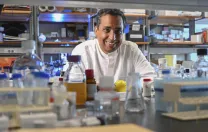“Harvard has been heavily involved in promoting regulatory oversight” of the use of human embryonic stem cells in research, says Insoo Hyun, director of the Center for Life Sciences and Public Learning at Boston’s Museum of Science and an affiliate of Harvard Medical School’s Center for Bioethics. Now, the importance of effective regulatory oversight matters more than ever, as burgeoning research into embryo models, which attempt to mimic the development of real embryos even though they are not derived from the fertilization of an egg, become a feature of laboratory science.
Through the Harvard Embryonic Stem Cell Research Oversight (ESCRO) committee and faculty leadership of organizations such as the International Society for Stem Cell Research (ISSCR), the University has been a leader in formulating and implementing ethical safeguards for the use of these cells. The ISSCR’s research guidelines have evolved in response to the changing scientific landscape, with significant revisions in 2006, 2008, 2016, and 2021. The stem-cell aggregates created in the Ramanathan lab, according to the 2021 vocabulary, are considered “non-integrated embryo models.” The term “non-integrated,” explains Hyun, “means that it is not the whole embryo that is being modeled.”
The vocabulary used to describe these models has evolved with the science. Because stem cells are routinely used to derive cell types that recapitulate organ development, the term “organoid” often appears in scientific papers. A more descriptive term, coined by Haas Foundations professor of linguistics Gennaro Chierchia during a 2018 discussion of nomenclature with Ann Kiessling (a member of the ESCRO committee and formerly an associate professor at Harvard Medical School), is “cellorg,” to denote an organ created from cells. Ramanathan uses the phrase “organized aggregate of stem cell derivatives that undergo morphogenesis” to describe his self-organizing neck-down models of the human body plan. (Ramanathan has chosen not to model the development of the head for ethical reasons.)
Non-integrated embryo models like Ramanathan’s do not require full committee review, according to the latest ISSCR guidelines. Harvard’s policy is to assess the moral and ethical dimensions of research using human embryonic stem cells on a case-by-case basis as part of a dialogue between researchers and the ESCRO committee. That group includes a legal expert, at least one bioethicist, a stem-cell scientist, a developmental biologist, an expert in artificial reproduction, and representatives from outside the University with relevant experience.
Though the terminology used to describe research sometimes becomes a battleground, the real question, says Hyun, is whether a model of an embryo carries moral weight. Often, sentience is the litmus test, which requires a brain. But there are other considerations. In Ramanathan’s case, his ability to reliably create large numbers of non-integrated embryo models is a “great step scientifically,” Hyun says, because it enables “outstanding experiments and has practical applications in drug development and industry.” At the same time, that “mass scale potential for creation,” he continues, could make some people uncomfortable. There’s that “fine line of wanting to do a lot of good by making tools to move forward scientifically and medically,” but weighed against “not wanting to over-instrumentalize or over-commercialize the human body….”








